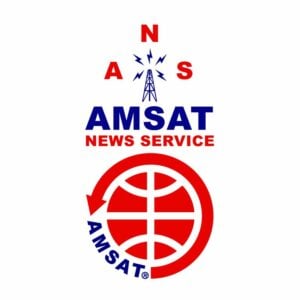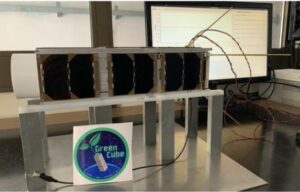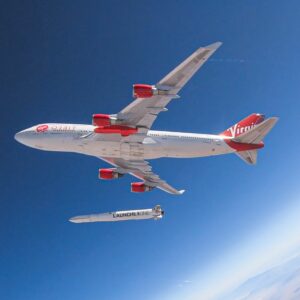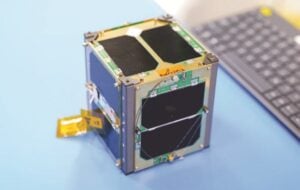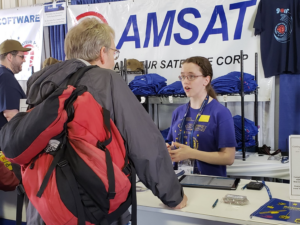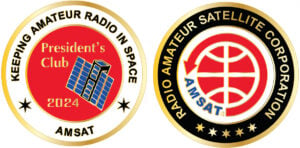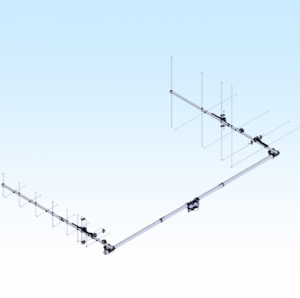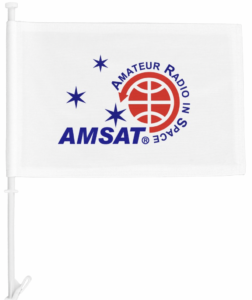In this edition:
* NASA Astronaut Loral O’Hara, Crewmates Return from ISS
* 2024 AMSAT/TAPR Banquet To Be Held Friday, May 17
* New NASA Strategy Envisions Sustainable Future for Space Ops
* Trash From The ISS May Have Hit A House In Florida
* VUCC and DXCC Satellite Standings for April 2024
* Changes to AMSAT-NA TLE Distribution for April 12
* Ending an Era, Final Delta Rocket Launched This Week
* ARISS News
* Upcoming Satellite Operations
* Hamfests, Conventions, Maker Faires, and Other Events
* Satellite Shorts From All Over
The AMSAT News Service bulletins are a free, weekly news and information service of AMSAT, the Radio Amateur Satellite Corporation. ANS publishes news related to Amateur Radio in Space including reports on the activities of a worldwide group of Amateur Radio operators who share an active interest in designing, building, launching and communicating through analog and digital Amateur Radio satellites.
The news feed on http://www.amsat.org publishes news of Amateur Radio in Space as soon as our volunteers can post it.
Please send any amateur satellite news or reports to: ans-editor [at] amsat.org
You can sign up for free e-mail delivery of the AMSAT News Service Bulletins via the ANS List; to join this list see: https://mailman.amsat.org/postorius/lists/ans.amsat.org/
ANS-105 AMSAT News Service Weekly Bulletins
DATE 2024 April 14
NASA Astronaut Loral O’Hara, Crewmates Return from ISS
NASA astronaut Loral O’Hara, KI5TOM, returned to Earth after a six-month research mission aboard the International Space Station on April 6, along with Roscosmos cosmonaut Oleg Novitskiy, and Belarus spaceflight participant Marina Vasilevskaya.
The trio departed the space station aboard the Soyuz MS-24 spacecraft at 03:54 UTC, and made a safe, parachute-assisted landing at 07:17 (12:17 p.m. Kazakhstan time), southeast of the remote town of Dzhezkazgan, Kazakhstan.
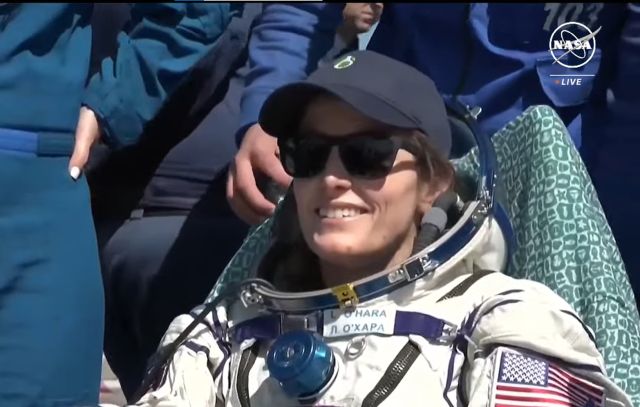
NASA astronaut Loral O’Hara returned to Earth on April 6, 2024, after a six-month research mission aboard the International Space Station.
(NASA image)
O’Hara launched Sept. 15, 2023, alongside Roscosmos cosmonauts Oleg Kononenko, RN3DX, and Nikolai Chub, who both will remain aboard the space station to complete a one-year mission. Novitskiy and Vasilevskaya launched aboard Soyuz MS-25 on March 23 along with NASA astronaut Tracy C. Dyson, who will remain aboard the orbiting laboratory until this fall.
O’Hara spent a total of 204 days in space as part of her first spaceflight. She completed approximately 3,264 orbits of the Earth and a journey of more than 86.5 million miles. O’Hara worked on scientific activities aboard the space station, including investigating heart health, cancer treatments, and space manufacturing techniques during her stay aboard the orbiting laboratory.
Following post-landing medical checks, the crew returned to the recovery staging city in Karaganda, Kazakhstan. O’Hara then boarded a NASA plane bound for her return to the agency’s Johnson Space Center in Houston.
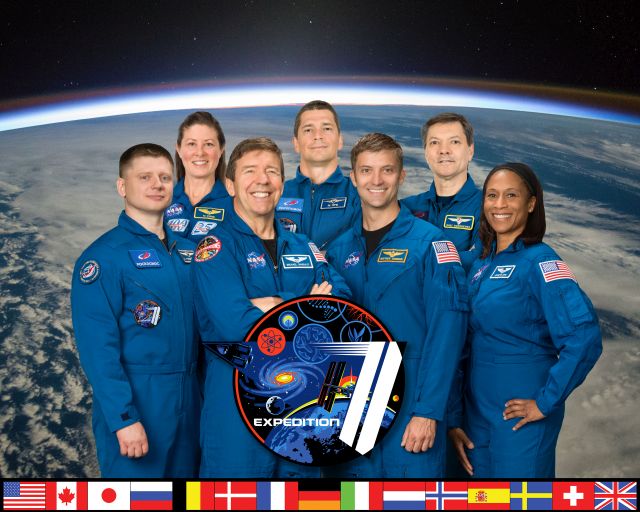
(Oct. 4, 2023) — The official Expedition 71 crew portrait with (bottom row from left) Roscosmos cosmonaut Alexander Grebenkin and NASA astronauts Mike Barratt, Matthew Dominick, and Jeanette Epps. In the back row (from left) are, NASA astronaut Loral O’Hara and Roscosmos cosmonauts Nikolai Chub and Oleg Kononenko. (NASA photo)
With the undocking of the Soyuz MS-24 spacecraft with O’Hara, Novitskiy and Vasilevskaya, Expedition 71 officially began aboard the station. NASA astronauts Michael Barratt, KD5MIJ, Matthew Dominick, KCØTOR, Tracy C. Dyson, and Jeannette Epps, KF5QNU, as well as Roscosmos cosmonauts Nikolai Chub, Alexander Grebenkin, RZ3DSE, and Oleg Kononenko, RN3DX, make up Expedition 71 and will remain on the orbiting laboratory until this fall.
[ANS thanks NASA for the above information]
The 2024 AMSAT President’s Club coins are here now!
Help Support GOLF and Fox Plus
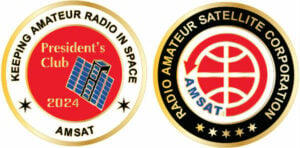
Join the AMSAT President’s Club today and help
Keep Amateur Radio in Space!
https://www.amsat.org/join-the-amsat-presidents-club/
2024 AMSAT/TAPR Banquet To Be Held Friday, May 17
The 15th annual AMSAT/TAPR Banquet will be held at the Kohler Presidential Banquet Center on Friday, May 17th at 18:30 EDT. This dinner is always a highlight of the TAPR (Tucson Amateur Packet Radio) and AMSAT (Radio Amateur Satellite Corp.) activities during the Dayton Hamvention. This year’s banquet speaker will be Bill Reed, NX5R, AMSAT PACSAT Project Manager, who will highlight the forthcoming PACSAT digital communications payload.
The Kohler Presidential Banquet Center is located at 4548 Presidential Way, Kettering, Ohio – about 20 minutes away from the Greene County Fairgrounds.
Tickets ($60 each) may be purchased from the AMSAT store. The banquet ticket purchase deadline is Friday, May 10th. Banquet tickets must be purchased in advance and will not be sold at the AMSAT booth. There will be no tickets to pick up at the AMSAT booth. Tickets purchased on-line will be maintained on a list with check-in at the door at the banquet center. Seating is limited to the number of meals reserved with the Kohler caterers based on the number of tickets sold by the deadline.
Menu
Set out as guests arrive
Crudite Platter
with dip on the side
Dinner Buffet
Roast Prime Rib of Beef Au jus
Carved on site. Served with horseradish and au jus on the side.
Almond Chicken
Deep Fried Tempura Shrimp
with Tomato Lemon Aioli
Risotto Cake
Fresh Asparagus
Smashed Cauliflower
Served to the table
Strawberry Fields
Assorted Dinner Rolls
Served with butter
Separate table
Assorted Layer Cake
Cheesecake
Beverages
Cash Bar
Regular and Decaf Coffee, Hot & Iced Tea, Water
New NASA Strategy Envisions Sustainable Future for Space Operations
To address a rapidly changing space operating environment and ensure its preservation for generations to come, NASA released the first part of its integrated Space Sustainability Strategy, on April 9, advancing the agency’s role as a global leader on this crucial issue.
“The release of this strategy marks true progress for NASA on space sustainability,” said NASA Deputy Administrator Pam Melroy. “Space is busy – and only getting busier. If we want to make sure that critical parts of space are preserved so that our children and grandchildren can continue to use them for the benefit of humanity, the time to act is now. NASA is making sure that we’re aligning our resources to support sustainable activity for us and for all.”
For decades, NASA has served as a proactive leader for responsible and sustainable space operations. Entities across the agency develop best practices, analytic tools, and technologies widely adopted by operators around the world. The new strategy seeks to integrate those efforts through a whole-of-agency approach – allowing NASA to focus its resources on the most pressing issues. To facilitate that integration, NASA will appoint a new director of space sustainability to coordinate activities across the agency.
Key aspects of our approach include providing global leadership in space sustainability, supporting equitable access to space, and ensuring NASA’s missions and operations enhance space sustainability.
Space environments currently are seeing the rapid emergence of commercial capabilities, many of them championed by NASA. These capabilities include increased low Earth orbit satellite activity and plans for the use of satellite constellations, autonomous spacecraft, and commercial space destinations. However, this increased activity also has generated challenges, such as an operating environment more crowded with spacecraft and increased debris. Understanding the risks and benefits associated with this growth is crucial for space sustainability.
Developed under the leadership of a crossagency advisory board, the space sustainability strategy focuses on advancements NASA can make toward measuring and assessing space sustainability in Earth orbit, identifying cost-effective ways to meet sustainability targets, incentivizing the adoption of sustainable practices through technology and policy development, and increasing efforts to share and receive information with the rest of the global space community.
NASA’s approach to space sustainability recognizes four operational domains: Earth, Earth orbit, the orbital area near and around the Moon known as cislunar space, and deep space, including other celestial bodies. The first volume of the strategy focuses on sustainability in Earth orbit. NASA plans to produce additional volumes focusing on the other domains.
Learn more about the Space Sustainability Strategy at: https://www.nasa.gov/spacesustainability
[ANS thanks NASA for the above information]
Need new satellite antennas?
Purchase M2 LEO-Packs from the AMSAT Store.
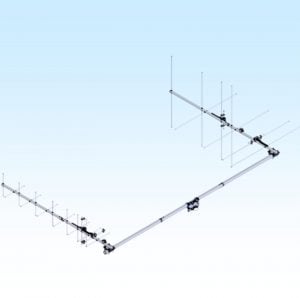
When you purchase through AMSAT, a portion of the proceeds goes towards
Keeping Amateur Radio in Space.
https://amsat.org/product-category/hardware/
Trash From The ISS May Have Hit A House In Florida
A few weeks ago, something from the heavens came crashing through the roof of Alejandro Otero’s Florida home, and NASA is on the case.
Otero wasn’t home at the time. A Nest home security camera captured the sound of the crash at 2:34 pm local time (19:34 UTC) on March 8. That’s an important piece of information because it is a close match for the time—2:29 pm EST (19:29 UTC)—that US Space Command recorded the reentry of a piece of space debris from the space station. At that time, the object was on a path over the Gulf of Mexico, heading toward southwest Florida.
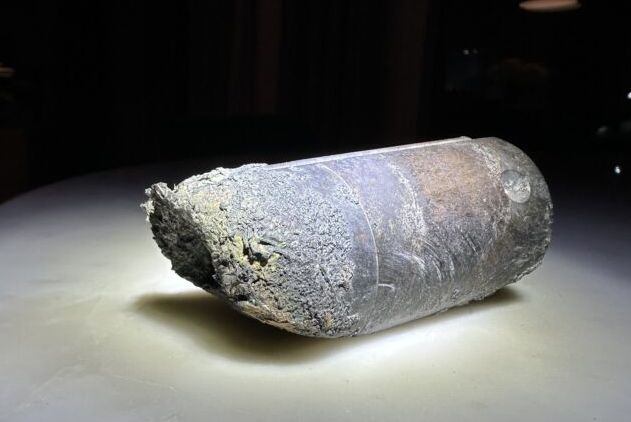
In all likelihood, this nearly 2-pound object came from the International Space Station.
Otero said it tore through the roof and both floors of his two-story house in Naples, Florida.
(Photo by Alejandro Otero on X)
This space junk consisted of depleted batteries from the ISS, attached to a cargo pallet that was originally supposed to come back to Earth in a controlled manner. But a series of delays meant this cargo pallet missed its ride back to Earth, so NASA jettisoned the batteries from the space station in 2021 to head for an unguided reentry.
NASA has recovered the debris from the homeowner, according to Josh Finch, an agency spokesperson. Engineers at NASA’s Kennedy Space Center will analyze the object “as soon as possible to determine its origin,” Finch told Ars. “More information will be available once the analysis is complete.”
The entire pallet, including the nine disused batteries from the space station’s power system, had a mass of more than 2.6 metric tons (5,800 pounds), according to NASA. Size-wise, it was about twice as tall as a standard kitchen refrigerator. It’s important to note that objects of this mass, or larger, regularly fall to Earth on guided trajectories, but they’re usually failed satellites or spent rocket stages left in orbit after completing their missions.
In a post on X, Otero said he is waiting for communication from “the responsible agencies” to resolve the cost of damages to his home. If the object is owned by NASA, Otero or his insurance company could make a claim against the federal government under the Federal Tort Claims Act, according to Michelle Hanlon, executive director of the Center for Air and Space Law at the University of Mississippi.
“It gets more interesting if this material is discovered to be not originally from the United States,” she told Ars. “If it is a human-made space object which was launched into space by another country, which caused damage on Earth, that country would be absolutely liable to the homeowner for the damage caused.”
This could be an issue in this case. The batteries were owned by NASA, but they were attached to a pallet structure launched by Japan’s space agency.
NASA typically doesn’t want large chunks of space debris falling to Earth with an uncontrolled reentry. You can trace the reason this object came down unguided back to a Russian launch failure more than five years ago. NASA astronaut Nick Hague and Russian commander Alexey Ovchinin aborted their launch on a Soyuz spacecraft when their rocket failed shortly after liftoff.
One of Hague’s jobs at the International Space Station would have been to go outside on spacewalks to help install a new set of lithium-ion batteries recently delivered by a Japanese HTV cargo ship. But Hague didn’t reach the station in 2018, so NASA put off the spacewalks until a new team of astronauts arrived at the complex.
This interruption to the space station’s carefully choreographed schedule threw off the entire multiyear plan for upgrading the batteries on the outpost’s electrical system. Instead of putting the old batteries back into the HTV for a guided destructive reentry over the open ocean, NASA held onto the cargo pallet at the station when the HTV supply ship needed to depart.
Each of the subsequent HTV missions delivered more fresh batteries to the space station and then departed the complex with the cargo pallet and decommissioned batteries from the previous HTV mission. That was the case until there were no more HTVs to fly. Japan’s last HTV spacecraft departed the ISS in 2020 with the cargo pallet and batteries from the prior flight, stranding the last battery pallet at the station.
The space station’s other cargo vehicles—SpaceX’s Dragon, Northrop Grumman’s Cygnus, and the Russian Progress—can’t accommodate the HTV cargo pallet.
So NASA decided to jettison the battery pallet using the space station’s robotic arm in March 2021 in order to free up real estate on the lab. Without any propulsion of their own, the batteries were adrift in orbit for three years until aerodynamic drag finally pulled the pallet back into the atmosphere on March 8, almost exactly three years later.
It is notoriously difficult to predict where a piece of space junk will reenter the atmosphere. US Space Command precisely tracks tens of thousands of objects in Earth orbit, but the exact density of the upper atmosphere is still largely an unknown variable. Even a half-day before the reentry, US Space Command’s estimate for when the battery pallet would fall to Earth had a window of uncertainty spanning six hours, enough time for the object to circle the planet four times.
And if you don’t know when something will reenter the atmosphere, you can’t predict where it will come down.
If NASA confirms the projectile that fell through Otero’s house last month came from the ISS, it would join a small handful of incidents when an object falling out of orbit damaged someone’s property.
Earth is a big place. It’s fairly common for someone to find a piece of fallen space junk in a field or washed up on a beach. But it is rare for a reentry to hit a structure or injure a person.
Falling space debris has never killed anyone. According to ESA, the annual risk of an individual human being injured by space debris is less than 1 in 100 billion.
[ANS thanks ARS Technical for the above information. Read the entire story at https://bit.ly/3xFJs9W.]
VUCC and DXCC Satellite Standings for April 2024
————————————————————
VUCC Satellite Award/Endorsement Change Summary for March 01, 2024 to April 01, 2024.
————————————————————
| Callsign | March 2024 | April 2024 |
| K8DP | 1629 | 1701 |
| AA5PK | 1450 | 1500 |
| N8RO | 1444 | 1455 |
| KF7R | 1128 | 1154 |
| XE1AO | 1000 | 1111 |
| KE8RJU | 950 | 1030 |
| WI7P | 975 | 1008 |
| K9UO | 950 | 1001 |
| KQ4DO | 880 | 906 |
| K0JM | 702 | 801 |
| KK4YEL | 728 | 768 |
| N8MR | 684 | 700 |
| A65BR | 554 | 632 |
| JS1LQI | 500 | 617 |
| N3CAL | 580 | 610 |
| SV8CS | New | 511 |
| JR0GAS | 360 | 500 |
| KO9A | 434 | 472 |
| N7UJJ | 308 | 462 |
| HC2FG | 350 | 413 |
| PA7RA | 408 | 409 |
| DL8GAM | 375 | 400 |
| HB9RYZ | 248 | 365 |
| W6AER | 302 | 355 |
| K6VHF | 300 | 325 |
| JH0BBE | 322 | 324 |
| XE1BMG | 120 | 300 |
| KA9CFD | 126 | 283 |
| I1FQH | 173 | 249 |
| AG1A | 100 | 200 |
| JO4JKL | 135 | 188 |
| W0PR | New | 176 |
| JK4JMO | New | 161 |
| AA0K | 100 | 155 |
| WD9EWK(DM25) | 120 | 138 |
| N6UTC(DM05) | 101 | 128 |
| N8HRZ | New | 102 |
| WD5GRW | New | 101 |
| K9DOG | New | 100 |
| W9FF | New | 100 |
————————————————————
Congratulations to the new VUCC holders.
SV8CS is first VUCC Satellite holder from KM07
DXCC Satellite Standing April 2024
————————————————————
DXCC Satellite Award/Endorsement Change Summary for March 01, 2024 to April 01, 2024.
————————————————————
| Callsign | March 2024 | April 2024 |
| SV8CS | 153 | 159 |
| KB8VAO | 135 | 148 |
| HB9RYZ | 145 | 147 |
| DL4ZAB | 138 | 139 |
| NK1K | 129 | 138 |
| DL2MIH | 111 | 132 |
| XE1MEX | 122 | 125 |
| KK5DO | 106 | 108 |
| K9UO | 101 | 106 |
| DL8GAM | 100 | 101 |
| XE1L | New | 100 |
————————————————————
Congratulations to the new DXCC Satellite holder.
XE1L is first DXCC Satellite holder from DL80
[ANS thanks Jon Goering, N7AZ, for the above information]
Want to fly the colors on your own grid expedition?
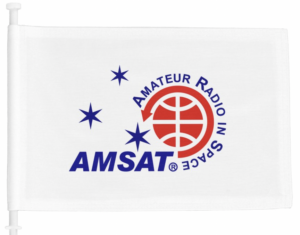
Get your AMSAT car flag and other neat stuff from our Zazzle store!
25% of the purchase price of each product goes towards
Keeping Amateur Radio in Space
https://www.zazzle.com/amsat_gear
Changes to AMSAT-NA TLE Distribution for April 12
Two Line Elements or TLEs, often referred to as Keplerian elements or keps in the amateur community, are the inputs to the SGP4 standard mathematical model of spacecraft orbits used by most amateur tracking programs. Weekly updates are completely adequate for most amateur satellites. TLE bulletin files are updated daily in the first hour of the UTC day. New bulletin files will be posted immediately after reliable elements become available for new amateur satellites. More information may be found at https://www.amsat.org/keplerian-elements-resources/.
This week there are no additions or deletions to the AMSAT TLE distribution.
[ANS thanks Joe Fitzgerald, KM1P, AMSAT Orbital Elements Manager, for the above information]
Ending an Era, Final Delta Rocket Launched This Week
Ending an era in U.S. rocketry, United Launch Alliance fired off its 16th and final triple-core Delta 4 Heavy Tuesday, launching a classified spy satellite in the last hurrah of a storied family of rockets dating back to the dawn of the space age.
The Heavy’s three hydrogen-fueled RS-68A first stage engines ignited with a rush of bright orange flame at 12:53 p.m. EDT, smoothly pushing the 235-foot-tall rocket away from pad 37 at the Cape Canaveral Space Force Station in Florida.
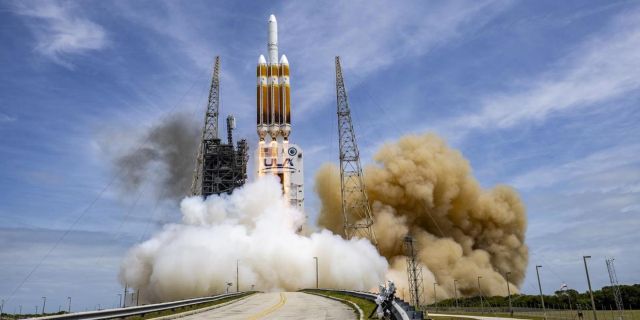
The last Delta 4 Heavy rocket climbs away from the Cape Canaveral Space Force Station on April 9, 2024,
carrying a classified National Reconnaissance Office spy satellite. (United Launch Alliance photo.)
The launch came 12 days late, primarily because of work to replace a pump in a system that supplies nitrogen gas to multiple launch pads from a pipeline running through the Kennedy Space Center and the Cape Canaveral Space Force Station. There were no problems Tuesday.
Mounted atop the rocket was a classified satellite provided by the National Reconnaissance Office, the secretive government agency that manages the nation’s fleet of sophisticated optical and radar imaging reconnaissance satellites and electronic eavesdropping stations.
In keeping with standard NRO-U.S. Space Force policy for such missions, no details about the NROL-70 payload were released. But about six hours after launch, the National Reconnaissance Office declared the launch a success, indicating the satellite reached its planned orbit.The final appearance of a Delta rocket 63 years after the first variant’s maiden flight was an emotional milestone for the managers, engineers and technicians who assembled and launched the last member of the family.
The Delta family of stages and rockets had its roots in the early space program, first serving in the nation’s fleet of intermediate-range ballistic missiles and evolving through multiple versions used to put military, NASA and civilian payloads into orbit.
The now-retired Delta 2 debuted in 1990, putting the first Global Positioning System satellites into orbit and sending multiple planetary probes into deep space, including Messenger to Mercury, multiple Mars orbiters, the Pathfinder, Spirit and Opportunity Mars rovers, the Spitzer Space Telescope and many more.
The single-core Delta 4 first flew in 2002 with the first Heavy following two years later. The single-core version flew the program’s final flight in 2019. Tuesday’s launch was the 45th flight of a Delta 4 and the 16th and final Delta 4 Heavy.
“Launching the last Delta 4 is bittersweet for me,” Col. Eric Zarybnisky, director of NRO’s Office of Space Launch, said in a statement. “I was part of the team that launched the first Delta 4 for the NRO. Since that time, the Delta 4 has put amazing capability on orbit for this nation.”
Tory Bruno, president and CEO of United Launch Alliance, also called the flight a “bittersweet” moment as the company continues its transition to next-generation Vulcan rockets, phasing out its more expensive Delta and Atlas families.
“Soon, Vulcan will pick up that mantle and we’re going to retire this venerable rocket that has made so much important work for our country,” he said after launch in a pre-recorded video.
[ANS thanks William Harwood, CBS News, for the above information]
ARISS NEWS
Amateurs and others around the world may listen in on contacts between amateurs operating in schools and allowing students to interact with astronauts and cosmonauts aboard the International Space Station. The downlink frequency on which to listen is 145.800 MHz worldwide.
RECENTLY COMPLETED
ARTADEMIA, Milano, Italy, AND Scuola Secondaria I grado “A. Moro”, Ponte Lambro (CO), Italy, direct via IK1SLD
The ISS callsign was OR4ISS. The crewmember was Jeanette Epps, KF5QNU. The ARISS mentor was IZ2GOJ.
Contact was successful: Wed 2024-04-10 13:16:48 UTC 53 degrees elevation
Congratulations to the ARTADEMIA and Scuola Secondaria I grado “A. Moro” students, Jeanette, mentor IZ2GOJ, and ground station IK1SLD!
Watch the recorded Livestream at https://www.youtube.com/live/sJoKzK2292U?si=BxXWi41cfsJJv4c2
UPCOMING
Mrs Ethelston’s CE Primary Academy at Axminster Community Academy Trust, Lyme Regis, United Kingdom, direct via GB4ACA
The ISS callsign is presently scheduled to be NA1SS. The scheduled crewmember is Matthew Dominick, KCØTOR. The ARISS mentor is MØXTD.
Contact is go for: Wed 2024-04-17 10:44:49 UTC 81 degrees elevation
Watch for Livestream at https://live.ariss.org
Mountain View Elementary, Marietta, GA, direct via KQ4JVI
The ISS callsign is presently scheduled to be NA1SS. The scheduled crewmember is Jeanette Epps, KF5QNU. The ARISS mentor is K4RGK.
Contact is go for: Thu 2024-04-18 17:48:40 UTC 44 deg
Watch for Livestream at https://youtube.com/live/lDjyV6P9x6I
The crossband repeater continues to be active (145.990 MHz up {PL 67} & 437.800 MHz down). If any crewmember is so inclined, all they have to do is pick up the microphone, raise the volume up, and talk on the crossband repeater. So give a listen, you just never know.
The packet system (145.825 MHz up & down) is currently misconfigured and not in operation.
The Ham TV system (2395.00 MHz down) is aboard but currently stowed. The BATC Ham TV wiki is at https://wiki.batc.org.uk/HAMTV_from_the_ISS and there is also a discussion channel available on the site.
The SSTV system (145.800 MHz down) is currently stowed.
As always, if there is an EVA, a docking, or an undocking; the ARISS radios are turned off as part of the safety protocol.
Note, all times are approximate. It is recommended that you do your own orbital prediction or start listening about 10 minutes before the listed time.
The latest information on the operation mode can be found at https://www.ariss.org/current-status-of-iss-stations.html
The latest list of frequencies in use can be found at https://www.ariss.org/contact-the-iss.html
[ANS thanks Charlie Sufana, AJ9N, one of the ARISS operation team mentors for the above information]
Upcoming Satellite Operations
Doug, N6UA will soon embark on a big circuitous rove covering parts of MT, ID, OR and NV. I’m guessing this will take place in the next week or two, but only Doug knows for certain. APRS is gonna be your friend here.
A growing number of satellite rovers are currently engaged in sharing their grid square activations on https://hams.at. By visiting the website, you gain easy access to comprehensive information about the operators responsible for activating specific grid squares. Additionally, you have the ability to assess the match score between yourself and a particular rover for a given pass, while also being able to identify the upcoming satellite passes that are accessible from your location.
[ANS thanks Ian Parsons, K5ZM, AMSAT rover page manager, for the above information]
Hamfests, Conventions, Maker Faires, and Other Events
AMSAT Ambassadors provide presentations, demonstrate communicating through amateur satellites, and host information tables at club meetings, hamfests, conventions, maker faires, and other events.
2024 CubeSat Developer’s Workshop
Tuesday April 23rd – Thursday April 25th
Cal Poly, San Luis Obispo, CA
https://www.cubesatdw.org/
Dayton Hamvention 2024
Friday May 17th – Sunday May 19th
Greene County Fairgrounds and Expo Center
120 Fairground Road
Xenia, OH 45385
https://hamvention.org
[ANS thanks the AMSAT Events page for the above information]
Satellite Shorts From All Over
+ NASA now knows what knocked Voyager 1 offline, but it will take a while to fix. Voyager 1’s remaining Flight Data Subsystem (its redundant copy failed in 1982) is the reason that the distant spacecraft is currently offline. Voyager’s FDS were the first computers on a spacecraft to use volatile memory. Unfortunately, one of Voyager 1’s FDS memory chips is malfunctioning—NASA hopes they can work around it, but it will likely take months.(ANS thanks The Orbital Index for the above information.)
+ If you have 26 minutes to spare, and want to explore more intricacies of Ohm’s Law than you were taught in school, watch electricity flow through a wire a nanosecond at a time at https://www.youtube.com/watch?v=2AXv49dDQJw (ANS thanks The Orbital Index for the above information.)
+ Following repairs to a liquid oxygen leak in the Falcon Heavy’s core booster, NASA and SpaceX have rescheduled the launch of the GOES-U satellite, the final installment in NOAA’s GOES-R Series, for June 25. The adjustment aims to ensure thorough examination and resolution of the issue, discovered during a routine inspection in February. With preparations now back on track, the deployment of GOES-U from Kennedy Space Center’s Launch Complex 39A will proceed using a SpaceX Falcon Heavy rocket. Managed cooperatively by NOAA and NASA, the GOES-R Series Program encompasses satellite operations, data dissemination, and ground systems oversight, with NASA’s Goddard Space Flight Center leading spacecraft acquisition and instrument development. Lockheed Martin’s contributions include design, construction, and testing of the satellites, while L3Harris Technologies has provided key instruments and ground systems essential for capturing atmospheric observations. (ANS thanks Clarence Oxford, SpaceDaily, for the above information)
+ The European Union is poised to finalize a security deal with the United States, enabling payments to Elon Musk’s SpaceX for satellite launches due to delays in Europe’s Ariane rocket system. Approved by national general affairs ministers, the agreement grants European Union and European Space Agency (ESA) personnel continuous access to launch facilities and prioritized debris retrieval rights in case of SpaceX rocket failures. With a 200 million deal already struck last year, SpaceX is contracted to launch four Galileo satellites as Ariane 6 faces further delays. While Ariane 6 is slated for a summer launch, commercial missions await later scheduling. The arrangement with SpaceX allows for two Galileo satellite launches this year, necessitated by Soyuz launcher cancellations and Ariane 6 delays. The security pact ensures access to classified Galileo equipment, with provisions for debris retrieval and a sunset clause by 2027 to address concerns about reliance on SpaceX over Ariane. (ANS thanks Joshua Poaaner, Politico Europe, for the above information)
+ NASA has been tasked by the White House to establish a lunar-centric time reference system, known as Coordinated Lunar Time (LTC), to aid missions requiring extreme precision on the moon. The agency has until the end of 2026 to set up LTC, which is not akin to Earth’s time zones but provides a frame of time reference for the moon. LTC will accommodate the slightly faster passage of time on the moon, approximately 58.7 microseconds each day compared to Earth, due to its lower gravity. It will serve as a benchmark for timekeeping for lunar spacecraft and satellites, crucial for their missions. NASA’s Artemis program, set to begin astronaut missions to the lunar surface in 2026, necessitates LTC for synchronization among Earth, lunar satellites, bases, and astronauts, without which data transfers and communications could be compromised. Developing LTC will require international agreements, possibly influenced by the Universal Coordinated Time (UTC) standard, with potential implementation involving atomic clocks on the moon and adherence to existing space agreements like the Artemis accords. (ANS thanks Diana Ramirez-Simon, The Guardian, for the above information)
Join AMSAT today at https://launch.amsat.org/
In addition to regular membership, AMSAT offers membership to:
* Societies (a recognized group, clubs or organization).
* Primary and secondary school students are eligible for membership at one-half the standard yearly rate.
* Post-secondary school students enrolled in at least half time status shall be eligible for the student rate for a maximum of 6 post-secondary years in this status.
* Memberships are available for annual and lifetime terms.
Contact info [at] amsat.org for additional membership information.
73 and remember to help Keep Amateur Radio in Space!
This week’s ANS Editor, Mark Johns, KØJM
k0jm [at] amsat.org
